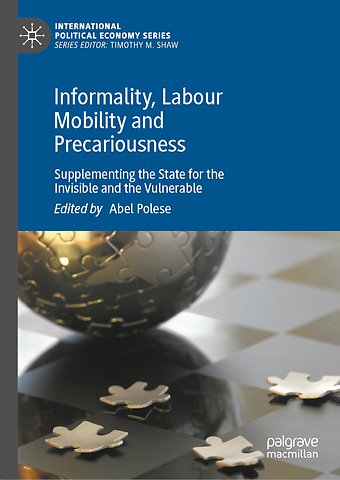Informality, Labour Mobility and Precariousness
Supplementing the State for the Invisible and the Vulnerable
Gebonden Engels 2021 1e druk 9783030824983Samenvatting
From the erosion of state legitimacy in Lebanon to the use of smartphones in Kyrgyzstan, from a Polish suburb to the music scene in Azerbaijan, this volume attempts to explain why, in a variety of world regions, a substantial number of people tend to ignore or act against state rules.
We propose to look at informality beyond simplistic associations of the phenomenon with a single category such as "informal labour" or "corruption".
By doing this, we propose to look for a correlation between the emergence, and persistence, of some informal practices and the quality of governance in a given area. We also suggest that a better understanding of the variety of informal practices present in a region can help conceptualising more adequate interventions and eventually improve the socio-economic conditions of its inhabitants.
Specificaties
Lezersrecensies
Inhoudsopgave
Chapter 1. The (im)moralities of informality: states, their citizens and conflicting moral orders (Abel Polese).
Part II. Coming.
Chapter 2. (Im)mobilities and Informality as Livelihood Strategies in Transnational Social Fields (Ignacio Fradejas-García, José Molina and Miranda Lubbers).
Chapter 3. Restaurant Backyards, Food Stores, and Temples. Invisibility, informal labour Practices, and Migrant Networks in the Suburbs of Warsaw (Karolina Bielenin-Lenczowska and Helena Patzer).
Chapter 4. Informal Networks Among Immigrant Entrepreneurs: Case of Croatia (Ružica Šimić Banović, Vlatka Škokić, Mirela Alpeza).
Chapter 5. “Performance of Illegality” towards migrants living with HIV in Russia: from Social Exclusion to Deportation (Daniel Kashinitsky).
Part III. Staying.
Chapter 5. Institutions and the Informal Economy – Tax Morale of Small Businesses in Armenia and Georgia (Joanna Paquin).
Chapter 6. Left in the “Shadows”: the Informal Moral Economy of the Russian Far East (Aimar Ventsel).
Chapter 7. Azerbaijani Meykhana: Cultural Policy and Local Actors’ Agenda (Aneta Strzemżalska).
Chapter 8. Everyday forms of governance in Uzbekistan: the illegal, the immoral and the illegitimate (Abel Polese, Rustamjon Urinboyev, Mans Svensson, Laura Adams, Tanel Kerikmäe).
Part IV. Competing.
Chapter 9. Mixed Perceptions of State Responsibility among Informal Sector Participants (Anil Duman).
Chapter 10. State Collusion or Erosion During a Sovereign Debt Crisis: Market Dynamics Spawn Informal Practices in Lebanon (Joseph Helou).
Chapter 11. Perceived Pull and Push Factors of Healthcare Professionals Intention for Mobility: The Case Of Romania (Elena Druică and Rodica Ianole – Călin)
Chapter 12. E-nformality: Smartphones as a New Regulatory Space for Informal Exchange of Formal Resources (Aksana Ismailbekova and Gulzat Baialieva).
Chapter 13. Work, Subsistence and Distress of the Homeless in Moldova (Petru Negură)
Anderen die dit boek kochten, kochten ook
Rubrieken
- advisering
- algemeen management
- coaching en trainen
- communicatie en media
- economie
- financieel management
- inkoop en logistiek
- internet en social media
- it-management / ict
- juridisch
- leiderschap
- marketing
- mens en maatschappij
- non-profit
- ondernemen
- organisatiekunde
- personal finance
- personeelsmanagement
- persoonlijke effectiviteit
- projectmanagement
- psychologie
- reclame en verkoop
- strategisch management
- verandermanagement
- werk en loopbaan







